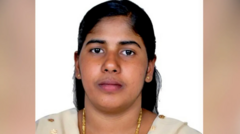Nimisha Priya, a 34-year-old Indian nurse imprisoned in Yemen's capital, Sanaa, faces imminent execution after being sentenced to death for allegedly murdering her former business partner, Talal Abdo Mahdi. The tragic case has captured public attention, with her family now putting their hopes on a pardon from Mahdi's family as her only route to survival.
In 2017, Mahdi's dismembered body was discovered in a water tank, leading to Nimisha's arrest. The president of the Houthi-controlled Supreme Political Council recently approved her death sentence, intensifying the urgency for her supporters. Under the Islamic judicial system, known as Sharia law, the execution can only be halted if the victim's family grants forgiveness.
For months, Nimisha's family has been crowdfunding "diyah," or blood money, intended for Mahdi's family to negotiate a pardon. However, as time runs out, the family's hopes hinge primarily on this family's decision, taking the situation from complex legal battles to profound ethical and emotional negotiations.
Samuel Jerome, a social worker in Yemen who represents Nimisha's mother, confirmed that the public prosecutor's office will again approach Mahdi's family about their stance on the execution. Meanwhile, an Indian lawyer assisting Nimisha's family mentioned the crowdfunding effort has successfully gathered about $40,000, which is intended for negotiations through local lawyers.
Under Yemeni law, direct contact between the families is prohibited, complicating matters further for Nimisha's relatives who are relying extensively on governmental support to facilitate dialogue with Mahdi's family. Nimisha's mother, Prema Kumari, is currently in Sanaa and has had limited emotional reunions with her daughter in prison.
Initially seeking better financial prospects, Nimisha moved to Yemen to work. After the civil war began in 2014, conditions spiraled downwards, impacting her business and relationship with Mahdi. Allegations of serious mistreatment and conflict between the two culminated following Mahdi's murder, with Nimisha asserting her innocence.
Despite their appeals to Yemen's Supreme Court being rejected, Nimisha's family has not lost hope, emphasizing that a settlement is possible. Nimisha's husband, Tony Thomas, emphasizes the importance of her presence in their daughter’s life and worries about the psychological impact of her absence, framing the situation within the emotional struggles their family faces.
As legal and social efforts continue, the path forward for Nimisha Priya remains fraught with challenges, underscoring the complexities of justice within the war-torn landscape of Yemen.


















